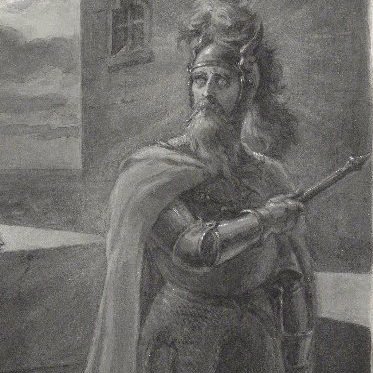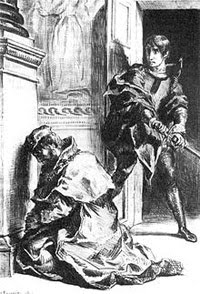
- Ghost: “The serpent that did sting thy father’s life/ Now wears his crown.” (1.5.776-77)
The fact that Claudius killed the King by pouring poison into his ear while he was asleep was revealed to Hamlet in the very first Act of the play. The only ones who initially know of this are Hamlet and the audience. Hamlet also knows that Claudius does not know that he knows of the murder.
- Polonius: “This is the very ecstasy of love.” (2.1.1061) “That hath made him mad.” (2.1.1070)
Hamlet: “To be or not to be – that is the question.” (3.1.56)
“O that this too too solid flesh would melt, thaw, and resolve itself into a dew.” (1.2.127-130)
There are two different ironies here. One is that while Polonius swears (even asks the King to chop his head off if he is wrong). Hamlet is mad due to his love for Ophelia, Hamlet is not likely mad, only pretending to be so to make his investigation easier about whether Claudius is actually guilty or not.
The second dramatic irony is that only Hamlet and the audience know that he is struggling with questions about suicide and death. Everyone else takes his deep words as a symptom of his madness. He contemplates suicide but refrains from doing so since it goes against Christian teachings. Hamlet believes in the afterlife, which is why he does not kill Claudius while he is praying so as to not send him to heaven.
- “I’ll have grounds/ More relative than this. The play’s the thing/ Wherein I’ll catch the conscience of the King.” (2.2.598-600)
Rosencrantz, Guildenstern, and Claudius are pleased when the players come. However, they do not know that Hamlet is devising a plan to confirm his suspicions on Claudius – Hamlet does not want to kill an innocent man, since Hamlet says the Ghost might even be lying as a devil in disguise. This adds to his inaction in taking revenge, in contrast to Laertes who wants to kill Claudius for killing Polonius without even confirming if it were true.

- “Speak the speech, I pray you, as I pronounced it to you, trippingly on the tongue.” (3.2.1-2)
Hamlet is telling the actors to act realistically, which is both a paradox because actors do not act out reality, but fiction, and is also dramatic irony because Claudius does not know that the play is meant to probe into his guilty conscience. Claudius must see his crime enacted as if it were real. The irony is that while Claudius believes the play to be fiction, Hamlet, Horatio, and the audience know that Hamlet wants it to look like the real murder.
- “Now might I do it pat, now he is praying, And now I’ll do’t.” (3.3.73-75)
Here Hamlet finally makes the decision to kill Claudius but stops when he sees him praying. Hamlet, knowing that his father may be in Purgatory, does not want to kill Claudius after he confessed his sins, but rather when he is partying, drinking, having incestuous sex, or committing some sort of sin.
However, Hamlet is ignorant of the fact that Claudius was lamenting that his prayers are empty because of his inaction to repent for the violence and pain he has caused.
This was a good chance for Hamlet to kill Claudius before Hamlet felt driven to kill Polonius, thinking it was Claudius (another example of dramatic irony, since only the audience and Gertrude, know that Polonius was behind the curtains), as well as before Laertes could kill him.
Other minor examples of dramatic irony:
We know Polonius is using Ophelia to be on good terms with the King and Queen. He does not truly care for her feelings.
Ophelia claims to be pure and honest, not desiring Hamlet’s attention; yet, Hamlet and Ophelia’s interactions suggest they had a sexual relationship with each other.
Evidence: (Hamlet) “That if you be honest and fair, your honesty should admit no discourse to your beauty.” (Ophelia) “Could beauty, my lord, have better commerce than with honesty?” (3.1.182-84)

Have really enjoyed your piece,it so detailed and informative
Superb